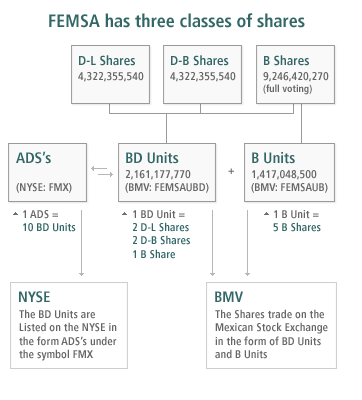Capital Stock
FEMSA was listed on the New York Stock Exchange on May 11, 1998. The company has 17,891,131,350 total underlying shares outstanding. These shares are divided into Series D-L Shares, Series D-B Shares, and Series B Shares that trade on the Mexican Stock Exchange in the form of BD Units and B Units and on the New York Stock Exchange in the form of American Depository Shares (ADS's).
To calculate FEMSA's market capitalization take the sum of the B and BD Units and divide that sum by 10 to get 357.82 million ADSs. Then, multiply this number by today's stock price to get the current market capitalization.
The table below illustrates the number of underlying shares in each series and the BD and B Units that these shares represent.

Each Series D-B and Series D-L Share is entitled to a dividend premium equal to 125% of the dividend distributed to each Series B Share.
Dividends generally are declared, if at all, during the first six months of the fiscal year, which ends on December 31. There is no guarantee that dividends will be declared and, if they are paid at all, they may be lower or higher than those paid in the past.
In accordance to Mexican law, income tax is not withheld from our dividend payments. Click here for our Dividend History.
Each Series B Share entitles its holder to one vote at any of our ordinary or extraordinary general shareholders meetings. Our bylaws state that the board of directors must be composed of no more than 21 members. Holders of Series B Shares are entitled to elect at least 11 members of our board of directors. Holders of Series D Shares are entitled to elect five members of our board of directors. Our bylaws also contemplate that, should a conversion of the Series D-L Shares to Series L Shares occur pursuant to the vote of our Series D-B and Series D-L shareholders at special and extraordinary shareholders meetings, the holders of Series D-L shares (who would become holders of newly-issued Series L Shares) will be entitled to elect two members of the board of directors. None of our shares has cumulative voting rights, which is a right not regulated under Mexican law.
Under our bylaws, the holders of Series D Shares are entitled to vote at extraordinary shareholders meetings called to consider any of the following limited matters:
- the transformation from one form of corporate organization to another, other than from a company with variable capital stock to a company without variable capital stock or vice versa,
- any merger in which we are not the surviving entity or with other entities whose principal corporate purposes are different from those of our company or our subsidiaries,
- change of our jurisdiction of incorporation,
- dissolution and liquidation and
- the cancellation of the registration of the Series D Shares or Series L Shares in the Mexican Stock Exchange or in any other foreign stock market where listed, except in the case of the conversion of these shares as provided for in our bylaws.
Holders of Series D Shares are also entitled to vote on the matters that they are expressly authorized to vote on by the Mexican Securities Law and at any extraordinary shareholders meeting called to consider any of the following matters:
- To approve a conversion of all of the outstanding Series D-B Shares and Series D-L Shares into Series B shares with full voting rights and Series L Shares with limited voting rights, respectively.
- To agree to the unbundling of their share Units.
This conversion and/or unbundling of shares would become effective two (2) years after the date on which the shareholders agreed to such conversion and/or unbundling.
Under Mexican law, holders of shares of any series are entitled to vote as a class in a special meeting governed by the same rules that apply to extraordinary shareholders meetings on any action that would have an effect on the rights of holders of shares of such series. There are no procedures for determining whether a particular proposed shareholder action requires a class vote, and Mexican law does not provide extensive guidance on the criteria to be applied in making such a determination.
Yes. FEMSA and its subsidiaries have a stock incentive plan with a 3-year vesting period, for certain top executives based on Economic Value Added (EVA). The plan is administered by a trust that purchase FEMSA BD Units and/or options on FEMSA BD Units on the open market (or Coca-Cola FEMSA Series L Shares and/or options for Coca-Cola FEMSA’s officers). (See our 20-F form for more information).
In accordance to Mexican law, FEMSA's shareholders approved a maximum amount to be potentially used in share repurchases during the fiscal year 2003. The established amount was Ps. 3,000 millions. FEMSA, however, has not actively pursued a share buy back program since January 2001.
Please submit your question using the form below.


